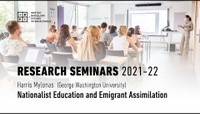Research Seminar | Nationalist Education and Emigrant Assimilation
Harris Mylonas (George Washington University). Chair: Chun-Ying Wu (IBEI)
Available in video:
What is the role of education in the country of origin for immigrants’ incorporation in their final destinations? Some scholars have argued that mass schooling with national content will produce durable identities that are hard to change. Such a mechanism can hinder educated immigrants’ assimilation into a new national group. On the other hand, nationalist curricula inculcate citizens with civic values which may be transferable to other country contexts, promoting integration. In this project, we test these hypotheses in the context of European migration to the US in the early 20th century. We exploit the staggered introduction of mass schooling with national content across European countries and the differential timing of immigrants’ arrival to the US in order to examine how nationalist education affects various aspects of integration including citizenship acquisition, exogamy, and naming patterns for immigrant children.
Co-authored with Vicky Fouka (Stanford University).
Harris Mylonas is Associate Professor of Political Science and International Affairs and editor-in-chief of Nationalities Papers. He interested in the processes of nation- and state-building, diaspora policies, and political development. His work contributes to our understanding of states’ management of diversity that may originate from national minorities, immigrants, diasporas, or refugees. He is particularly interested in the role of decision makers’ perceptions about foreign involvement in their domestic affairs and the impact these perceptions have on the planning and implementation of state policies.
Co-organized by IBEI and ETHNICGOODS



